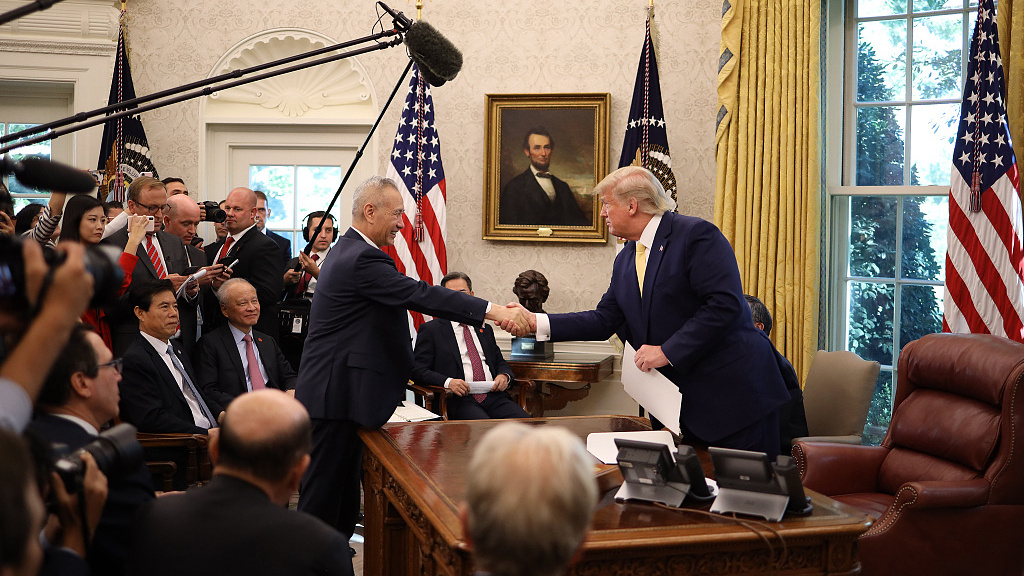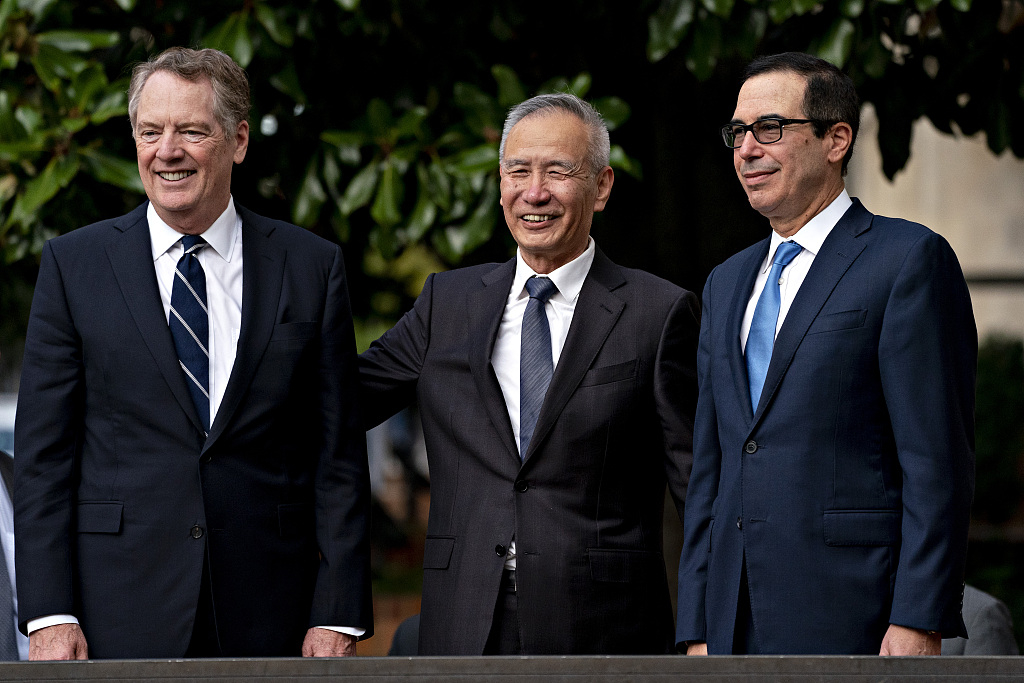
Editor's Note: Tom Fowdy is a British political and international relations analyst and a graduate of Durham and Oxford universities. He writes on topics pertaining to China, the DPRK, Britain and the United States. The article reflects the author's opinions and not necessarily the views of CGTN.
Last night following a successful round of trade talks at the White House, attended by China's Vice Premier Liu He, Trump struck a positive tone on the outcome and moved to describe it as "Phase One" of a trade deal. He said that the United States and China had successfully reached the first segment of what he described as a large deal, which would be panned out in the coming months.
Markets reacted positively to the announcement. It marks the third "trade truce" or "détente" that has taken place in the on-going dispute between the two countries, with the previous two being December-February last year and the G20 summit in Osaka in June.
However, one will also recall from memory that both of these truces failed to hedge a greater breakthrough, with the president abruptly ending them with an option for more escalation. Now, however, Trump appears to be putting more direct stakes on a personal endgame. Calling it a "phase" and starting a broader deal would be signed at the APEC summit in November.
So what does this all mean? Audiences should be positive but also sober and cautious. The American economy has been slowing down and Trump has been feeling a great deal of political pressure. He wants to be seen as "winning" on China, but sometimes the definition of such "winning" hasn't always included the most productive thing, Beijing has been more resilient than he assumed.
Nevertheless, his use of language and symbolism indicates this is marginally better than before. This is a breakthrough and a much-needed choice for stability, but it is not a conclusion. Thus whilst nothing is guaranteed, it is good news.
Given the events of the past few months, it certainly comes as a surprise that Trump now is choosing his moment to make progress with trade talks. There are a number of reasons why. First of all, Trump is under pressure and so is the American economy.
The trade war has produced an indisputable slowdown on U.S. GDP growth, forced U.S. manufacturing into a recession and devastated American agriculture. Over the past few months, we have seen how Trump has become anxious about the economy, blaming the Federal Reserve for the slowdown.

Liu He, China's vice premier (C) stands with Robert Lighthizer, U.S. trade representative (L) and Steven Mnuchin, U.S. Treasury secretary, while arriving for a meeting with at the Office of the U.S. Trade Representative in Washington, D.C., U.S., October 10, 2019. /VCG Photo
Liu He, China's vice premier (C) stands with Robert Lighthizer, U.S. trade representative (L) and Steven Mnuchin, U.S. Treasury secretary, while arriving for a meeting with at the Office of the U.S. Trade Representative in Washington, D.C., U.S., October 10, 2019. /VCG Photo
On that note, his "personal pressure" includes the looming controversy of the impeachment inquiry against him and the view to his election next year. It doesn't look too good. The U.S. president's trade war strategy, encouraged by his advisers, has been to try and make China capitulate to unilateral American terms. This also hasn't been a success.
Beijing's negotiating strategy has been to hold tight and firm, demanding fairness and reciprocity. This has led the U.S. president to fear that if he doesn't give some scope for a deal, they may simply wait him out and try again with his successor. In essence, time is now not on Trump's side; he needs his "China win."
Given this, there are signs (despite abruptly ending previous windows of a similar nature) that Trump may finally be prepared to make this his trade war end-game, especially as he has already pinpointed a date and expectations as to win the next level will be ascended to (The APEC summit in Chile).
However, skeptics will point out that nothing is guaranteed yet, noting the agreement was not signed on paper. The initial agreement is welcome, but they observe in some ways it is narrow to start off, negotiations have to be waged and concluded.
Everyone knows how unpredictable and random this can be with Trump, with seemingly positive outcomes being jettisoned in weeks and days through the simple mantra of a tweet, even catching his own officials off guard. He has kept the pending tariffs in December on for a reason; there are still things he wants to obtain from China.
However, as a whole, who can genuinely say this is bad news? It is a much-needed respite for stability for a global economy that is profoundly hurting from Trump's trade war hysterics. A step in the right direction is undoubtedly needed, and without a doubt, more escalation through the proposed tariff increase (from 25 to 30 percent) would have been disastrous.
Overall though, we can hope that this is a window to the end of the trade war, but for now, ultimately, it's important we sit still and be ready for anything.
(If you want to contribute and have specific expertise, please contact us at opinions@cgtn.com.)